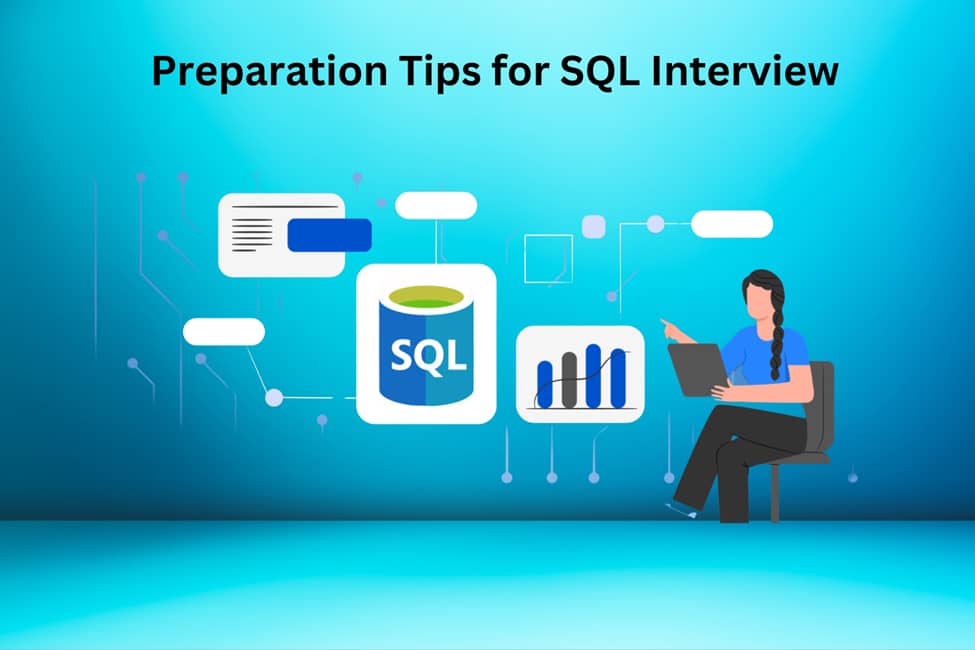Structured Query Language (SQL) is essential for many positions in business research, software development, and data administration. It is recommended to undergo SQL Courses to effectively work in SQL projects. This blog will give you the knowledge and confidence to impress interviewers with well-prepared SQL Interview Questions and get your desired job.
Table of Contents
- Understanding SQL Basics
- Advanced SQL Concepts
- Practising SQL Queries
- Understanding Database Design
- Familiarising with SQL Server-Specific Features
- Understanding Performance Tuning
- Preparing for Behavioural Questions
- Mock Interviews and Review
- Conclusion
Understanding SQL Basics
A strong grasp of SQL concepts is essential to success in an SQL interview. The standard database administration and manipulation language is SQL. Queries and updates of relational database data are commonly used. To start your preparation, make sure you understand the fundamental SQL functions:
- SELECT: Extracting data from databases.
- INSERT: Adding new records.
- UPDATE: Modifying existing records.
- DELETE: Removing records.
- JOIN: Combining data from multiple tables.
Your preparedness starts with learning these fundamental instructions. Verify that you can construct basic queries and are familiar with the syntax and application of every command.
Advanced SQL Concepts
Explore more complex SQL ideas after you are at ease with the fundamentals. Often, interviews ask you to do more than just basic CRUD (Create, Read, Update, Delete) tasks. Among the advanced subjects you need to be conversant with are:
- Subqueries: Writing questions inside other questions.
- Views: Laying out virtual tables.
- Indexes: Optimising query performance with indexes.
- Stored Procedures: Written reusable SQL code is known as a stored procedure.
- Triggers: SQL code execution is done automatically in reaction to specific events.
- Transactions: Maintaining data integrity using the ACID (Atomicity, Consistency, Isolation, Durability) characteristics.
Knowing these sophisticated ideas will show you can manage challenging SQL operations and maximise database performance.
Practising SQL Queries
Practice is vital to mastering SQL. Use SQL problem-solving websites like SQL Zoo, Hacker Rank, or Leet Code. These platforms offer basic SQL problems. Regular practice will teach you to understand various questions and sharpen your problem-solving abilities.
Understanding Database Design
Interviews involving SQL require a solid grasp of database design concepts. Perhaps a scenario will be used to guide your database structure design. Essential ideas to be studied consist of the following:
- Normalisation: Data organisation to lower redundancy is known as normalisation.
- Denormalisation: Table combining for increased performance.
- Entity-Relationship (ER) Diagrams: Database structures visualised with Entity-Relationship (ER) Diagrams.
- Connecting tables: primary and foreign keys.
Designing logical and effective database schemas will demonstrate your competence with practical database management duties.
Familiarising with SQL Server-Specific Features
Numerous extensions and special features of various database management systems (DBMS) exist for regular SQL. Depending on the business and the DBMS they use, you could have to become familiar with aspects of systems like MySQL, PostgreSQL, Oracle, or Microsoft SQL Server; by way of example:
- MySQL: Discover features exclusive to MySQL and storage engines like MyISAM and InnoDB.
- PostgreSQL: Discover PostgreSQL's sophisticated JSON support and indexing methods.
- Oracle: Discover Oracle's PL/SQL and optimisation capabilities.
- Microsoft SQL Server: Master T-SQL and SQL Server Management Studio (SSMS) for Microsoft SQL Server.
Gaining expertise on the business's DBMS can help during the interview.
Understanding Performance Tuning
One essential ability is SQL performance tweaking. Interviewers frequently probe query performance optimisation. The main areas to concentrate on consist of the following:
- Indexes: Knowledge of their creation and efficient application.
- Query Execution Plans: Analysis and interpretation of query execution plans are necessary to find bottlenecks.
- Methodologies of Optimisation: Using methods like joins correctly, SELECT statements without extra columns, and query restructuring.
- Database Configuration: Understanding memory allocation and indexing techniques is essential to configuring databases for best performance.
Your ability to show that you understand performance tuning can help you stand out from other applicants.
Preparing for Behavioural Questions
SQL interviews frequently incorporate behavioural questions to gauge your problem-solving style and ability to work well in a team in addition to technical ones. Come ready to talk about your prior database and SQL experience. Some often-asked behavioural questions are:
- Describe a challenging SQL problem you solved and how you approached it.
- Describe an instance in which you improved a slow-running query.
- Talk of a time when you had to create a database from scratch.
For organised and convincing answers, answer these questions using the STAR (Situation, Task, Action, Result) approach.
Mock Interviews and Review
To finally replicate the actual interview experience, take part in practice interviews. Mock SQL interviews are available online or practised with a friend. Examine your responses to find places that need improvement. Practising interviews will improve your confidence and sharpen your problem-solving skills.
Conclusion
An SQL interview requires a blend of theoretical understanding, real-world experience, and problem-solving abilities. You can improve your interview readiness by learning the fundamentals of SQL, grasping more complex ideas, practising often, and becoming acquainted with specific DBMS capabilities. Moreover, you will have a complete advantage if you know how to tweak your performance and are ready for behavioural queries. You may do well in your SQL interview and land the job you want with regular work and careful preparation.








